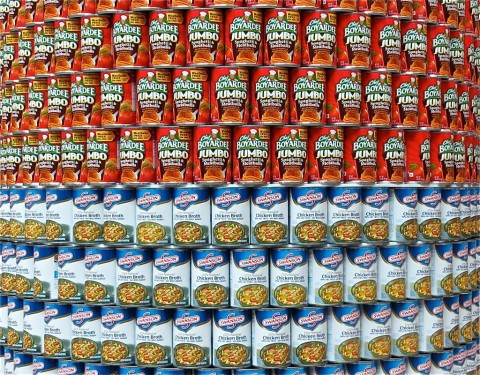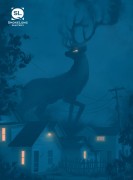Friday at 4:30, he thought as he maneuvered his cart between a woman in business casual struck dumb before an endcap and a guy pushing a cart with nothing in it but two green twelve packs of Vernors and two brown twelve packs of A&W: Never again. “Dude,” he heard and dismissed. The butter was right up here, Land O’Lakes with canola oil: white tub, green lid, good spreader. Past the orange juice and the rolls — crescent, dinner, cinnamon — the moist, tacky dough of which was encased in cardboard cylinders one opened by pulling a red ribbon, which as it was lifted from its spiral compromised the integrity of the seal so that the pressurized goo and air burst forth with a percussive little plop. “Dude,” he heard, louder. There, whoops. They changed the label. The smiling brunette in Native American garb now loomed huge, freed from the quarter-sized confines of her previous logo, and no longer bearing a miniature tub of Land O’Lakes with her own miniaturized, tub-bearing image on the label. She’d been simplified, enlarged. Now the customer had no choice but to look upon her vacant, dawn-lit gaze, the fiftiesish rouge, the blow-up doll smile, and say to himself, Yes, this is my brand. “Dude!” He turned. The guy with the twelve packs was right there, acne-scarred, wave-banged, seashell choker. “I ain’t fuckin gay,” the twelve pack guy said, cocking his head to several different angles in quick succession. The woman in business casual gasped, sucking in the way she did when she spilled her coffee on the console or watched one of her kids take a shot on goal. “I didn’t say you were,” he said. He felt himself blush. He had made eye contact with the guy as he’d passed, and not wanting to seem… what? aggressive? dismissive? like he couldn’t give two shits about their chance moment of non-intimacy? like he could? he’d smiled. The twelve pack guy was a good four inches shorter, thirty pounds lighter, ten years younger. Not twenty minutes earlier NPR had reported on the day’s school shooting in Texas. He’d switched over to the CD player. Bonnie “Prince” Billy, self titled. The last lyric he’d heard, which was the line he’d sung beneath his breath a half dozen times since walking into the store, went: Where can I put my fingers that will make you weep? “Gotta go,” he said, holding up the butter. “My wife’s making cookies.” Which was true. Though she used stick butter for that. This butter was for things like toast, banana bread, grilled cheese sandwiches, wholesome celebratory fare the whole family could enjoy. He dropped the tub of butter in the cart and walked away, veering left down the first aisle he came to, the ice cream aisle, at once waiting for the sound of the shot and correcting himself — if the kid shot him point blank he’d never hear it. The woman in business casual would abandon her cart and run. More would join her, everyone but the mobility-challenged, eventually. If all you could do was shuffle, shuffle was what you did. If you were trampled, or if the kid with the gun took you out, that was simply how your story ended. You didn’t have to like it. You didn’t even have to acknowledge it, let alone prepare yourself to face it. At the end of the ice cream aisle he turned left again, and then right, and then left into the juice aisle for his daughter’s t-ball team’s post-game Gatorades. His heartbeat was a mess. He looked back the way he’d come, waiting. When the twelve pack guy failed to appear he moved on, two aisles over for Oreo snack packs, then to Deli for cheese, to Produce for high-end chips, and finally to the checkout. Bypassing the automated lanes for twenty items or fewer where the twelve pack guy might find him, he walked until he came to a lane with a free cashier. Her name was Tonya. He recognized her. She was older than his mom, always sullen as a goth kid, black. She took his canvas bags and set them up on the plastic bag holders and rang him up while he entered his mPerks. The total came to a little over sixty dollars. He inserted his card chip-first into the reader, entered his pin, declined cash back, wished he hadn’t — he liked to have twenty bucks or so in his wallet, just in case — took his receipt and stuffed it down into his back pocket. In time it’d make its way into the trash, but first it would spend a while crumpled on either the kitchen or he and his wife’s bathroom counter. Then tonight, or in a day or two, when he picked up a little, he’d toss it with nary a double take. If he remembered the shopping trip by then at all it would only be because of the guy buying twelve packs, whom he’d spooked, been confronted by, and fled from, the event and the subsequent story, which for a day or two he’d tell everyone he saw, entertaining, feeding his friends, family, and acquaintances’ desire to be bewildered, their desire to escape unscathed. Not their desire for resolution, though. Once, for about fifteen seconds, he would consider what might have happened if he’d asked the guy what was wrong, if he’d tried to get more of the story. But the fact was he’d been like, Nope, see ya, freak. His friends, family, and acquaintances wouldn’t blame him. In his shoes, they would say, they’d have done the same thing. Sensational as the story was, they’d soon forget it. It was all butter, wouldn’t stick. Or a baked good scarfed for its fleeting sugar zing. That it dissolved so quickly on your tongue was essential to its charm. You wanted more, right? Friend, you were in luck.
The Good Old Days

Art by Dean Hochman


 The SmokeLong Grand Micro Contest (The Mikey) is now an annual competition celebrating and compensating the best micro fiction and nonfiction online.
The SmokeLong Grand Micro Contest (The Mikey) is now an annual competition celebrating and compensating the best micro fiction and nonfiction online.